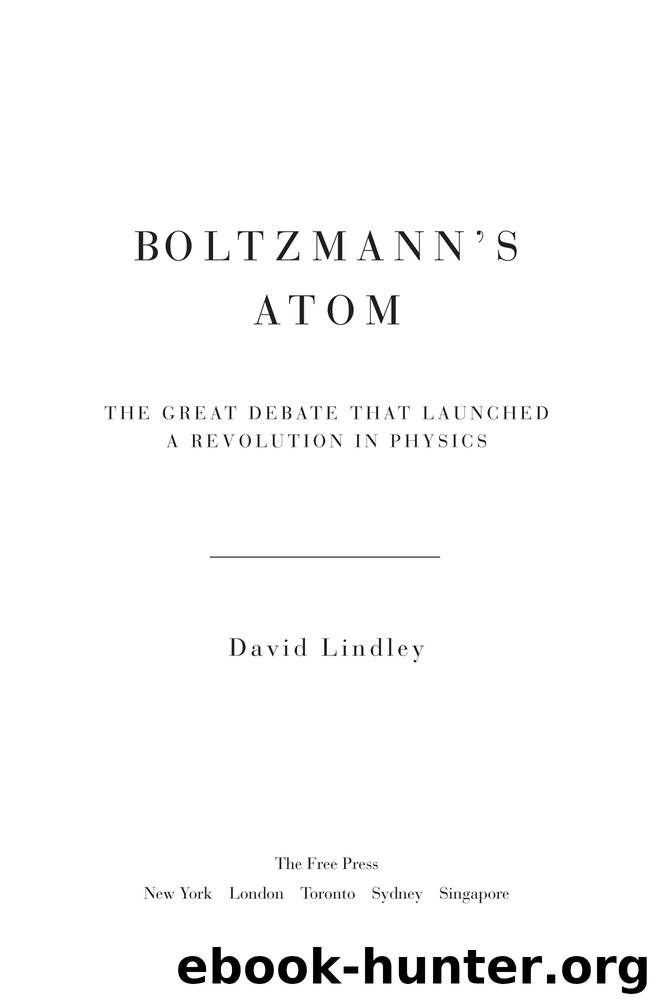Boltzmanns Atom by David Lindley

Author:David Lindley
Language: eng
Format: epub
Publisher: Free Press
ADDING TO Boltzmann’s woes, the old reversibility objection came up again, in somewhat different form, and from a new corner. The great French mathematician Henri Poincaré had in 1893 proved a theorem showing that any closed mechanical system must, in the course of time, return to its starting point. This conclusion was relevant to a point that both Boltzmann and Maxwell had addressed but not resolved. In thinking about the way a set of atoms constantly moves from one possible dynamical state to another, they had assumed, without proof, a degree of randomness, so that a gas would visit all possible states in an essentially statistical manner. Poincaré’s theorem proved that in at least one respect this randomness was not absolute. It stated with mathematical certainty that the system would at some point come back to its starting point and therefore begin repeating itself. Poincaré noted at the time that his result might prove troublesome for what he called “the English kinetic theories.”
A couple of years later, a student of Max Planck’s by the name of Ernst Zermelo made the attack specific. If, as Poincaré’s theorem demanded, the atoms in a gas must sooner or later return to the exact configuration they began in, then Boltzmann’s H-theorem could not always be obeyed. If the system evolved at first so that H decreased and entropy increased, then eventually it must go back the other way, with H increasing and entropy decreasing. Therefore, Zermelo said, the idea of kinetic theory that a gas of atoms would inevitably evolve toward equilibrium—maximum entropy—and stay there was simply wrong.
Although he had a powerful new theorem to back him, Zermelo was saying nothing that Loschmidt and then the English critics had not said before. Yes, Boltzmann agreed, a system might sometimes move in a way that would decrease entropy. Now Poincaré had proved that such things indeed must happen. But the question, as always, was how likely such events were. To say, even with mathematical certainty, that an event must happen is not to say that it will happen often, or even in a humanly imaginable period of time. Boltzmann took to the fray again, no doubt with some weariness. His published reply to Zermelo displays a mixture of sarcasm and petulance.
“Herr Zermelo’s paper indeed shows that the relevant works of mine have not been understood; even so I am bound to be pleased by this paper as the first indication that these works have been given any attention at all in Germany,” he declared in the introduction, and after going through all the technical matters concluded: “All objections raised against the mechanical view of nature are thus void of substance and based on error. He however who finds himself unable to overcome the difficulties that a clear exposition of gas-theory principles offers should in that case follow Herr Zermelo’s advice, and resolve to give the matter up.”
To make his point specific, Boltzmann estimated the approximate time that a simple system of about one trillion atoms,
Download
This site does not store any files on its server. We only index and link to content provided by other sites. Please contact the content providers to delete copyright contents if any and email us, we'll remove relevant links or contents immediately.
| Atomic & Nuclear Physics | Particle Physics |
The Complete Stick Figure Physics Tutorials by Allen Sarah(7338)
Secrets of Antigravity Propulsion: Tesla, UFOs, and Classified Aerospace Technology by Ph.D. Paul A. Laviolette(5333)
Thing Explainer by Randall Munroe(3910)
The River of Consciousness by Oliver Sacks(3572)
The Order of Time by Carlo Rovelli(3162)
How To by Randall Munroe(3074)
A Brief History of Time by Stephen Hawking(2992)
I Live in the Future & Here's How It Works by Nick Bilton(2960)
What If?: Serious Scientific Answers to Absurd Hypothetical Questions by Randall Munroe(2669)
The Great Unknown by Marcus du Sautoy(2662)
Midnight in Chernobyl by Adam Higginbotham(2516)
Blockchain: Ultimate Step By Step Guide To Understanding Blockchain Technology, Bitcoin Creation, and the future of Money (Novice to Expert) by Keizer Söze(2467)
Networks: An Introduction by Newman Mark(2382)
The Meaning of it All by Richard Feynman(2319)
Easy Electronics by Charles Platt(2308)
The Tao of Physics by Fritjof Capra(2247)
Midnight in Chernobyl: The Untold Story of the World's Greatest Nuclear Disaster by Adam Higginbotham(2196)
When by Daniel H Pink(2098)
Introducing Relativity by Bruce Bassett(2097)
